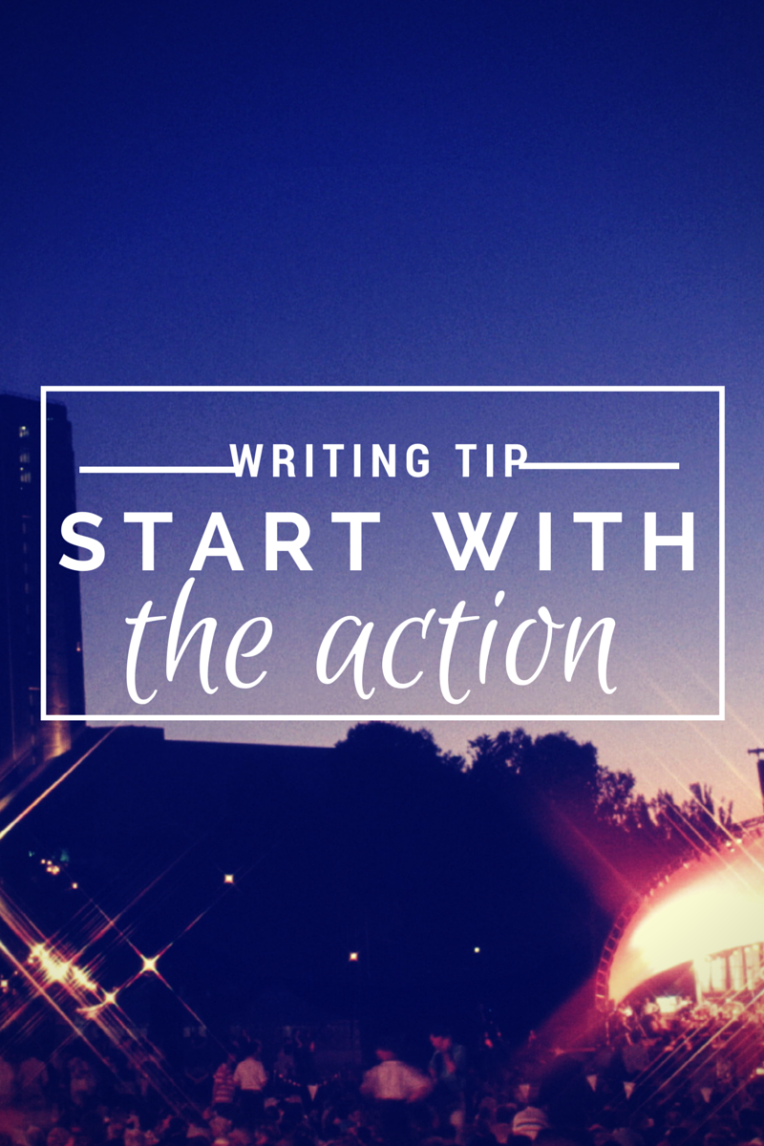How should you begin your novel? The best way is to start with the action!
This is a concept that’s taken me many stories to understand. When writing my first draft of One Last Letter, I included a flashback scene that showed Jesse and Evelyn as young teenagers. They were making a promise to one another to stay together forever. It was a great scene and I loved it and then when I was editing with Crimson Romance’s brilliant editor Julie Sturgeon, she said: “This has gotta go.”
To be honest, the action of the story didn’t start with that promise. The action started a few years later, when Evelyn returns from school and she no longer believes she can be with Jesse. That’s where my story needed to begin. The same issue happened with Revolutionary Hearts. I’d drafted a scene right before the hero and heroine meet for the first time. It was a discussion between the heroine and her grandmother – fun dialogue, but again, not where the action starts.
Why should you start with the action? It grips your reader’s interest and hooks the reader from the beginning. I know I make judgments about whether or not I’m going to buy a new book based on first chapter excerpts. If the beginning of your book isn’t strong, your reader won’t stick around to see if the rest is any better!
Here’s a few questions to ask yourself to tighten up your writing and start with the action:
- Is the first scene necessary? With most of my first drafts, I realize the first scene was written to offer me (the writer) a chance to better understand my characters. But if you cut out the first scene and the rest of the novel still flows well? That first scene probably isn’t where the action starts.
- Does this scene set the plot in motion, or is it just background? The first scene should be the catalyst that drives the rest of the story. It’s indispensable. The alternative to a scene setting the plot in motion is a scene that just explains the background. Backstory can be weaved in through different devices, but it’s difficult to digest as an information dump in the beginning.
- What critical action or event must take place? For many romance novels, it’s when the hero and heroine meet for the first time. For thriller novels, it’s when a shooting occurs or a body is found. It’s the kind of scene that, if cut, would cause the rest of the story to make no sense. This is the type of scene that should begin your work!
Starting your novel off strong will pique your reader’s interest and keep your reader engaged. Any other tips for starting your story? Do you start with the action? I’d love to hear your thoughts.

I personally feel it’s important to start off in a way that captures the reader’s mind. It’s like watching a film 🙂
Many films are also wonderful examples of starting off with action! Just like a great film, a great story should have a compelling hook.
Oh, the terrifying beginning of a novel! Every writer is afraid of it, I think. Most of us keep hearing “start with the action!” and, at least at first, don’t know what it means exactly. Someone is chasing somebody else and shooting a gun? Someone just died in the MC’s arms? Someone just fell in love? Wait, what? Who are these people? What’s happening?! Why are they running/shooting/dying/falling in love? Why should I (as a reader) even care? It’s so confusing.
I’ve read somewhere that, in order to decide what scene should be our opening scene, the one in the very first few pages of our book, we should think about the inciting incident, the event that sets things in motion, that upsets the balance. Then, we should work backwards and think about the scene right before that one, that sets the tone and gives the elements that will be used in the inciting incident. That will be our opening scene.
It took me a while to understand and apply this to my writing, but I think it’s a good advice, because the book basically does start with the action, just not in the very confusing middle of it! 🙂
Love the idea of working backwards and looking for the scene that “upsets the balance.” What sets the plot in motion IS what upsets the former balance of the situation prior to the story beginning. Great advice.
Reblogged this on My Passion's Pen.